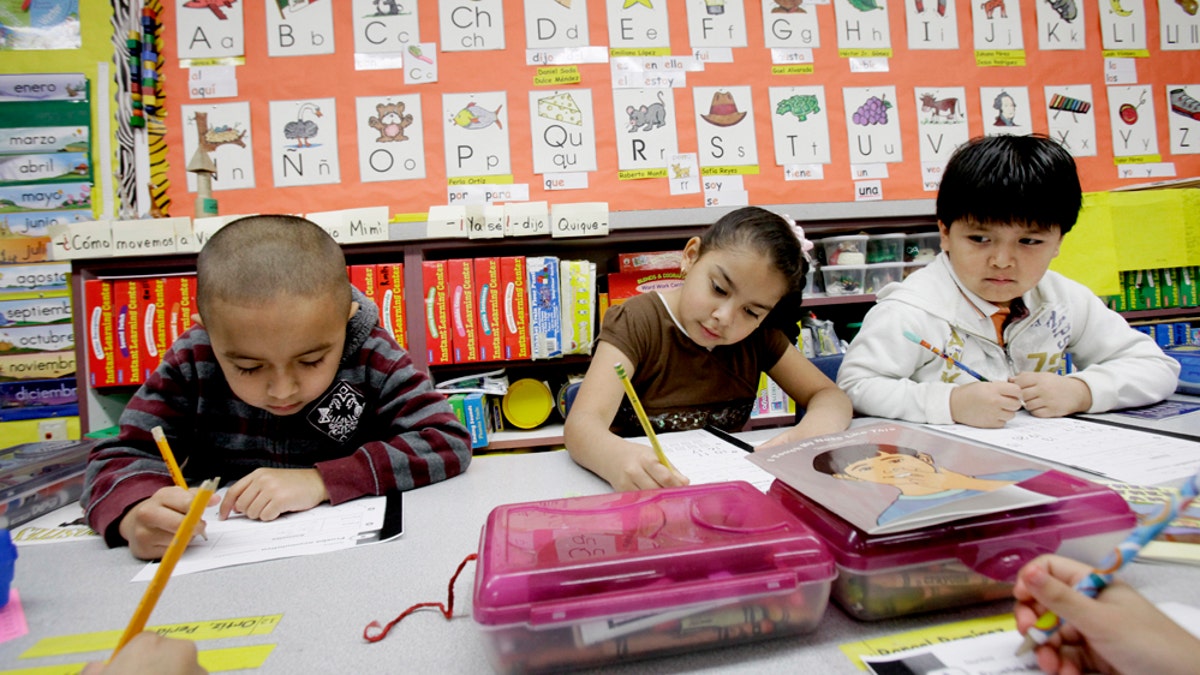
In this photo made Tuesday, Feb. 15, 2011, five-year-old kindergarden students Gael Alvarado, left, Perla Ortiz, center, and Yahir Perez do school work in a bilingual english-spanish class at Hanby Elementary School in Mesquite, Texas. Mesquite ISD, like many districts in Texas, has seen a demographic shift in the racial make up students over the past 10 years. Hispanics account for two-thirds of Texas' growth over the past decade and now make up 38 percent of the state's total population, according to new local U.S. Census figures released Thursday, Feb. 17, 2011. (AP Photo/LM Otero) (AP Photo/LM Otero) (AP2011)
I grew up in Laredo, Texas, where the Latino population has always hovered close to 90 percent. I don’t remember being conscious of that, there were no Latinos or non-Latinos, we were all just people. Everyone had rich vowels in their names, mixed Spanish with their English and had tíos and primos.
So the recent revelation that Latinos will be the majority in Texas by 2040 was, for me, a foregone conclusion. Even all these years later, living in San Antonio for more than 25 years, the announcement that Latinos are 63 percent of the city’s population is not culturally astonishing or politically sobering. It is what it is, and that’s all.
In places other than Texas the fact is surprising, as if Latinos crept from behind the woodwork to be suddenly noticed by an unsuspecting majority. The more genteel folks thinking: “It’s not so much that they’re Latinos, it’s just that there are so many of them.” And we’re young and still reproducing at a championship rate: 95 percent of the children born in Texas, according to the Census count, are Latino. But here’s the thing: They’re also Texan, and American.
There’s a wise Spanish saying that goes como me ves, te veras, as you see me you will see yourself. It applies here. As Texas is today most parts of the country will be in the not too distant future. I see it as a great opportunity.
Texas has a long history of Latinos as part of its social fabric. There were Latinos that fought on both sides of the battle of the Alamo. My own Latino family has been here since before this was Texas. There have been hard won battles concerning Latino civil rights and educational equity, economic opportunity and basic city services.
So as the Latino presence grows and spreads east and north, some of the questions being asked are not so new: Can Latinos integrate? Where I live we’ve been America lovin’ Texans for many generations – spilled blood on foreign soil, built businesses, and did the work that needed to be done. Will newly-arrived Latinos assimilate? Define assimilation. I often speak Spanish among family and friends, but my kids are as American as any other – they act the same, talk the same, dress the same and listen to the same music louder than I’d like. Will Latinos change American politics? Forty-one percent of Latinos are eligible to vote, and every year half a million Latinos turn 18 – do the math.
Is there a reason to worry? We’re not worried, but then again, this is south Texas. Yet every day I read reports about the Latino Diaspora-Latinos settling in places where there had never been Latinos before—and how some communities are struggling with that change and their new ethnic neighbors. The funny thing is that, if not for young Latino families, many counties across the country would be dead or dying: 760 counties out of 3142 in the country have recorded more deaths than births. A similar thing happened in 2002. Back then the Latino influx turned the tide on many communities and saved the counties. That’s what a young, quickly reproducing community will do. Now project that into the future.
Latinos are on average 10 years younger than the rest of the population, so the real impact is a decade down the road, when a young Latino workforce will sustain Social Security, save dying cities and vote. And in the process Latinos will mix Spanish with their English and celebrate their tios and their primos. It’s not new, for me it’s the way it’s always been.
Victor Landa is an editor at NewsTaco.com, owner of Palabrero Communications and contributing columnist at the San Antonio Express-News.
Follow us on twitter.com/foxnewslatino
Like us at facebook.com/foxnewslatino

